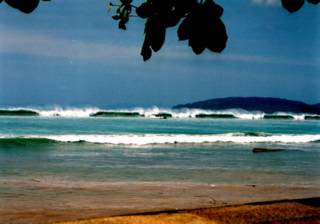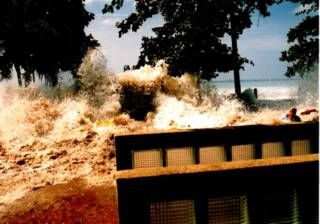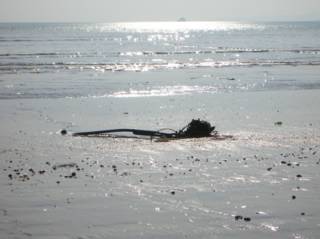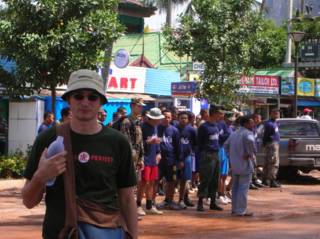This is an account of what I saw of the tsunami. It’s nothing to compare to the scenes I’ve since seen on the television. What I’ve seen on TV since has shaken me far more than the actual experience. We didn’t discover the scale of the disaster until the next day when we reached Bangkok.
We were trying to check out of our bungalow in Ao Nang, Krabi, Thailand at about 10am on the day the tsunami hit. The staff were all on the street, looking down the hill towards the sea. There was some commotion outside – policemen whistling – shopkeepers on the street – but nothing to suggest what we were about to see. After checking out, we made our way down towards the beach – we were on our way to spend Boxing Day on Ton Sai beach, next to Rei Leh. Ton Sai can only be reached by long tail boat.
The sea road was waterlogged. We initially thought a drain had burst as the water was a muddy brown colour. Crowds of people were looking out to sea. We were carrying all our gear, so I was impatient to get on a boat, and pointed this out to Ella. “There are no boats,” she said. Every day, 30 or 40 long tail boats crowded the bay, vying for custom. There were about two left.

Confused, we joined the ranks of people looking out to sea. Two larger boats, about eight feet high, were out there, some distance from the shore. One kayak was even further out.
We were looking at a calm sea when suddenly a largish wave headed towards the shore. This was followed by another. It was hard to tell how big the waves were from our perspective on the 10 feet high sea wall, but the two larger boats at sea seemed to be propelled to about twice their height with each wave. With the crowds of people congregated, we never really felt as if we were in any danger. Asking around, no one seemed to be able to explain what had happened. I asked a local if this had happened before – wondering whether the surf got up occasionally – he said “yes”, but I eventually realised he meant “yes, about five minutes ago”.

More large waves raced to the shore. The boats were in trouble. I noticed three men on the roof of one of them, clinging on. The kayak rode the waves, which were gradually increasing in size. I began to realise what had been responsible for the waterlogged road. I can’t believe now that it took me so long to realise this, but everything was happening so quickly, without explanation. I’ve seen bigger waves in England, so perhaps this was another reason why we continued to stand and watch.

Feeling more and more unnerved as the waves continued to roll in, I suggested to Ella that we cancel our plans to stay on Ton Sai and check in to another guest house where we were in Ao Nang. She wanted to stay and watch, so we did. Without us knowing it, Ton Sai, with no sea wall, and just bamboo beach bars, had already been smashed to pieces.
Ella was taking photos of the waves. We were right on the edge of the sea wall. A Thai guy was watching the sea in earnest. Whenever a big wave approached, he shouted and pointed, urging people to move away. Ella wasn’t keen. I was. We stayed put.
I was watching the Thai guy when the giant wave was emerging on the sky line. Panic was etched on his face. I looked out to sea and saw a much bigger wave approaching. It seemed to be travelling at an astonishing pace. The kayak, dwarfed by the wave, somehow rode it, looking like a rollercoaster. Another even bigger wave was behind it. Ella and I grabbed each other’s hands and ran to the other side of the road. Before we got there, the wave crashed into the sea wall, swept back into the sea, then seemed to merge with the next wave. Before we knew it, we were waste deep in water. The wave had crashed over the ten foot sea wall. With my pack on my back, another bag in my hand, the other hand holding Ella’s, I had one leg knocked from under me, and just about kept my balance. The drag, the sheer power of the water, even here on the road, was immense. One or two people had stayed by the sea wall and were gingerly picking themselves up. Another guy next to us was swept into a wall.


What I did next is hard to understand now that I know what really happened. I was annoyed that I’d got wet. I was upset. I’d wanted to book into a guest house a few minutes earlier. I was worried about all the gear in my bags. So, after a quick look round to make sure everyone was on their feet, I stormed off up the hill towards a cheap guest house. Ella trailed in my wake. It seems obvious now that many of the long tail boats had been smashed to pieces by the first wave that we’d missed. It seems obvious now that anyone who had been on the beach when that first wave hit had probably been swept away. At the time I didn’t even imagine that this might have been something that had happened without warning. Neither of us thought that it was anything other than a freak wave that happened here from time to time.
We sat in our guest house room. I was angry, and didn’t really know why. I told Ella that I’d just been nearly knocked off my feet. I told her that I’d been left standing precariously on the leg which has a torn knee ligament. I told her I’d nearly lost everything. She told me I was being dramatic. We’ve talked about this moment since, the moment when around the Andaman Sea and the Indian Ocean, thousands of people had lost their lives, yet I was being grouchy about a few cheap t-shirts in my rucksack, and Ella thought I was being over the top.
Even later, after we had made our way back to the beach, we still had no idea what had happened. We watched the kayak somehow get safely to shore. I started to text my mum to tell her that if she heard of a freak wave in Thailand, I was ok. I deleted the text before I sent it, thinking that this would never be world news.
Just before the army and the police arrived, I lost Ella for about five minutes. Another wave was expected in half an hour. That surging feeling of panic hit my guts. I found her about 10 metres from where I left her, chatting to a couple of Americans. No wave came, but I didn’t leave her side for the rest of the day.


Thinking back now, I can only surmise that we were in shock. Combine this with our ignorance – we still had no idea that we had seen a tsunami. As much as three hours later, we were still wandering the streets, looking out to sea, looking at the rubble, walking past long tail boats that had been flipped onto the sea wall, looking at signs that had been ripped out of their concrete foundations, seeing single flip flops strewn on the streets; our blank faces meeting other blank faces. No one – neither tourists nor Thais - seemed to be doing anything but sitting and looking, or wandering aimlessly, or staring out to sea without expression. We even walked along the beach – why else would we have done this unless we were in shock and ignorance? The water was still receding and advancing rapidly, as if the tide was going in and out within minutes. The boat on which the three men had been hanging had sunk no more than ten metres from the shore. Ella thinks the boat had hit the sea wall, bits missing from the front of the boat now added to the debris on the beach.


We started to get a few texts from home. Concerned family and friends were wondering if we were ok. We began to hear of deaths in Sri Lanka and India.
Two rescue dinghies were pumped up with a foot pump on a truck and sent out to sea. One came back a while later. About 20 people surrounded it and stood looking at it for a while before finally a stretcher finally arrived and carried out a body into an awaiting ambulance. We still have no idea whether the person was alive or dead.
Other larger boats started to arrive carrying hordes of people who had been stranded on nearby islands. They were dropped off about 20 metres from the shore, carrying their rucksacks above their heads through the shallows.

A missing persons desk was set up outside the tourist police station. At the time I still thought everyone would be ok.
This may seem like an emotionless account of the day, but that’s because we were numbed by what we had seen and didn’t understand what had happened. Our emotional response came later when the shock had begun to wear off and the full story unfolded. Like when we began to see pictures of the places we had been to only days before – Kamala Beach in Phuket and Phi-Phi island – destroyed. Like when I saw the images of Sri Lanka – Unawatuna Bay, the town of Galle, both of which I visited in October – the photos I took and the things I wrote about on this blog. The train that was derailed was the train I had travelled on from Columbo to Galle. When Ella’s photos were developed in Bangkok we were both shaking as we looked through them. We saw footage of Ao Nang, shot 10 metres from where we had been standing, on CNN World.
When I downloaded my Thailand holiday photos last night and we sat and looked at the beautiful places we had visited that have been destroyed it was another very emotional moment. When I think of the five minutes of panic that I felt when Ella and I were apart, she was in no danger, although I thought she was. I can’t even begin to imagine how many times multiplied that sense of panic must have been for the countless victims of this horrendous disaster. Although this entry has really been my attempt to report what I saw that day, through insensate eyes, I have to conclude by saying, however obvious, that the innocent loss of life now fills me with horror.












